- Home
- Elmore Leonard
Three-Ten to Yuma and Other Stories Page 8
Three-Ten to Yuma and Other Stories Read online
Page 8
“He’s a talker,” Chink said.
Billy-Jack appeared in the doorway of the adobe. “Frank, five o’clock, sure as hell!” He waved a sheet of yellow paper.
“See!” Willard Mims was grinning excitedly. “Listen, you let us go and we’ll be on our way”—his voice rose—“and I swear to God we’ll never breathe we saw a thing.”
Chink shook his head. “He’s somethin’.”
“Listen, I swear to God we won’t tell anything!”
“I know you won’t,” Frank Usher said. He looked at Brennan and nodded toward Mims. “Where’d you find him?”
“We just met.”
“Do you go along with what he’s saying?”
“If I said yes,” Brennan answered, “you wouldn’t believe me. And you’d be right.”
A smile almost touched Frank Usher’s mouth. “Dumb even talking about it, isn’t it?”
“I guess it is,” Brennan said.
“You know what’s going to happen to you?” Usher asked him tonelessly.
Brennan nodded, without answering.
Frank Usher studied him in silence. Then, “Are you scared?”
Brennan nodded again. “Sure I am.”
“You’re honest about it. I’ll say that for you.”
“I don’t know of a better time to be honest,” Brennan said.
Chink said, “That damn well’s going to be chock full.”
Willard Mims had listened with disbelief, his eyes wide. Now he said hurriedly, “Wait a minute! What’re you listening to him for? I told you, I swear to God I won’t say one word about this. If you don’t trust him, then keep him here! I don’t know this man. I’m not speaking for him, anyway.”
“I’d be inclined to trust him before I would you,” Frank Usher said.
“He’s got nothing to do with it! We picked him up out on the desert!”
Chink raised his .44 waist high, looking at Willard Mims, and said, “Start running for that well and see if you can make it.”
“Man, be reasonable!”
Frank Usher shook his head. “You aren’t leaving, and you’re not going to be standing here when that stage pulls in. You can scream and carry on, but that’s the way it is.”
“What about my wife?”
“I can’t help her being a woman.”
Willard Mims was about to say something, but stopped. His eyes went to the adobe, then back to Usher. He lowered his voice and all the excitement was gone from it. “You know who she is?” He moved closer to Usher. “She’s the daughter of old man Gateway, who happens to own part of the third richest copper mine in Arizona. You know what that amounts to? To date, three quarters of a million dollars.” He said this slowly, looking straight at Frank Usher.
“Make a point out of it,” Usher said.
“Man, it’s practically staring you right in the face! You got the daughter of a man who’s practically a millionaire. His only daughter! What do you think he’ll pay to get her back?”
Frank Usher said, “I don’t know. What?”
“Whatever you ask! You sit here waiting for a two-bit holdup and you got a gold mine right in your hands!”
“How do I know she’s his daughter?”
Willard Mims looked at Brennan. “You were talking to that driver. Didn’t he tell you?”
Brennan hesitated. If the man wanted to bargain with his wife, that was his business. It would give them time; that was the main thing. Brennan nodded. “That’s right. His wife is Doretta Gateway.”
“Where do you come in?” Usher asked Willard Mims.
“I’m Mr. Gateway’s general manager on the Montezuma operation.”
Frank Usher was silent now, staring at Mims. Finally he said, “I suppose you’d be willing to ride in with a note.”
“Certainly,” Mims quickly replied.
“And we’d never see you again.”
“Would I save my own skin and leave my wife here?”
Usher nodded. “I believe you would.”
“Then there’s no use talking about it.” Mims shrugged and, watching him, Brennan knew he was acting, taking a long chance.
“We can talk about it,” Frank Usher said, “because if we do it, we do it my way.” He glanced at the house. “Billy-Jack!” Then to Brennan, “You and him go sit over against the wall.”
Billy-Jack came out, and from the wall of the adobe Brennan and Willard watched the three outlaws. They stood in close, and Frank Usher was doing the talking. After a few minutes Billy-Jack went into the adobe again and came out with the yellow stage schedule and an envelope. Usher took them and, against the door of the Concord, wrote something on the back of the schedule.
He came toward them folding the paper into the envelope. He sealed the envelope and handed it with the pencil to Willard Mims. “You put Gateway’s name on it and where to find him. Mark it personal and urgent.”
Willard Mims said, “I can see him myself and tell him.”
“You will,” Frank Usher said, “but not how you think. You’re going to stop on the main road one mile before you get to Bisbee and give that envelope to somebody passing in. The note tells Gateway you have something to tell him about his daughter and to come alone. When he goes out, you’ll tell him the story. If he says no, then he never sees his daughter again. If he says yes, he’s to bring fifty thousand in U.S. scrip divided in three saddlebags, to a place up back of the Sasabe. And he brings it alone.”
Mims said, “What if there isn’t that much cash on hand?”
“That’s his problem.”
“Well, why can’t I go right to his house and tell him?”
“Because Billy-Jack’s going to be along to bring you back after you tell him. And I don’t want him someplace he can get cornered.”
“Oh….”
“That’s whether he says yes or no,” Frank Usher added.
Mims was silent for a moment. “But how’ll Mr. Gateway know where to come?”
“If he agrees, Billy-Jack’ll give him directions.”
Mims said, “Then when he comes out you’ll let us go? Is that it?”
“That’s it.”
“When do we leave?”
“Right this minute.”
“Can I say good-bye to my wife?”
“We’ll do it for you.”
Brennan watched Billy-Jack come around from the corral, leading two horses. Willard Mims moved toward one of them and they both mounted. Billy-Jack reined his horse suddenly, crowding Mims to turn with him, then slapped Mims’s horse on the rump and spurred after it as the horse broke to a run.
Watching them, his eyes half closed, Frank Usher said, “That boy puts his wife up on the stake and then he wants to kiss her good-bye.” He glanced at Brennan. “You figure that one for me.”
Brennan shook his head. “What I’d like to know is why you only asked for fifty thousand.”
Frank Usher shrugged. “I’m not greedy.”
Chapter Three
Chink turned as the two horses splashed over the creek and grew gradually smaller down the road. He looked at Brennan and then his eyes went to Frank Usher. “We don’t have a need for this one, Frank.”
Usher’s dull eyes flicked toward him. “You bring around the horses and I’ll worry about him.”
“We might as well do it now as later,” Chink said.
“We’re taking him with us.”
“What for?”
“Because I say so. That reason enough?”
“Frank, we could run him for the well and both take a crack at him.”
“Get the horses,” Frank Usher said flatly, and stared at Chink until the gunman turned and walked away.
Brennan said, “I’d like to bury this man before we go.”
Usher shook his head. “Put him in the well.”
“That’s no fit place!”
Usher stared at Brennan for a long moment. “Don’t push your luck. He goes in the well, whether you do it or Chink does.”
Br
ennan pulled Rintoon’s limp body up over his shoulder and carried him across the yard. When he returned, Chink was coming around the adobe with three horses already saddled. Frank Usher stood near the house and now Doretta Mims appeared in the doorway.
Usher looked at her. “You’ll have to fork one of these like the rest of us. There ain’t no lady’s saddle about.”
She came out, neither answering nor looking at him.
Usher called to Brennan, “Cut one out of that team and shoot the rest,” nodding to the stagecoach.
Minutes later the Sasabe station was deserted.
They followed the creek west for almost an hour before swinging south toward high country. Leaving the creek, Brennan had thought: Five more miles and I’m home. And his eyes hung on the long shallow cup of the Sasabe valley until they entered a trough that climbed winding ahead of them through the hills, and the valley was no longer in view.
Frank Usher led them single file—Doretta Mims, followed by Brennan, and Chink bringing up the rear. Chink rode slouched, swaying with the movement of his dun mare, chewing idly on the drawstring of his hat, and watching Brennan.
Brennan kept his eyes on the woman much of the time. For almost a mile, as they rode along the creek, he had watched her body shaking silently and he knew that she was crying. She had very nearly cried mounting the horse—pulling her skirts down almost desperately, then sitting, holding on to the saddle horn with both hands, biting her lower lip and not looking at them. Chink had sidestepped his dun close to her and said something, and she had turned her head quickly as the color rose from her throat over her face.
They dipped down into a barranca thick with willow and cottonwood and followed another stream that finally disappeared into the rocks at the far end. And after that they began to climb again. For some time they rode through the soft gloom of timber, following switchbacks as the slope became steeper, then came out into the open and crossed a bare gravelly slope, the sandstone peaks above them cold pink in the fading sunlight.
They were nearing the other side of the open grade when Frank Usher said, “Here we are.”
Brennan looked beyond him and now he could make out, through the pines they were approaching, a weather-scarred stone-and-log hut built snugly against the steep wall of sandstone. Against one side of the hut was a hide-covered lean-to. He heard Frank Usher say, “Chink, you get the man making a fire and I’ll get the woman fixing supper.”
There had not been time to eat what the woman had prepared at the stage station and now Frank Usher and Chink ate hungrily, hunkered down a dozen yards out from the lean-to where Brennan and the woman stood.
Brennan took a plate of the jerky and day-old pan bread, but Doretta Mims did not touch the food. She stood next to him, half turned from him, and continued to stare through the trees across the bare slope in the direction they had come. Once Brennan said to her, “You better eat something,” but she did not answer him.
When they were finished, Frank Usher ordered them into the hut.
“You stay there the night…and if either of you comes near the door, we’ll let go, no questions asked. That plain?”
The woman went in hurriedly. When Brennan entered he saw her huddled against the back wall near a corner.
The sod-covered hut was windowless, and he could barely make her out in the dimness. He wanted to go and sit next to her, but it went through his mind that most likely she was as afraid of him as she was of Frank Usher and Chink. So he made room for himself against the wall where they had placed the saddles, folding a saddle blanket to rest his elbow on as he eased himself to the dirt floor. Let her try and get hold of herself, he thought; then maybe she will want somebody to talk to.
He made a cigarette and lit it, seeing the mask of her face briefly as the match flared, then he eased himself lower until his head was resting against a saddle, and smoked in the dim silence.
Soon the hut was full dark. Now he could not see the woman, though he imagined that he could feel her presence. Outside, Usher and Chink had added wood to the cook fire in front of the lean-to and the warm glow of it illuminated the doorless opening of the hut.
They’ll sit by the fire, Brennan thought, and one of them will always be awake. You’d get about one step through that door and bam. Maybe Frank would aim low, but Chink would shoot to kill. He became angry thinking of Chink, but there was nothing he could do about it and he drew on the cigarette slowly to make himself relax, thinking: Take it easy: you’ve got the woman to consider. He thought of her as his responsibility and not even a doubt entered his mind that she was not. She was a woman, alone. The reason was as simple as that.
He heard her move as he was snubbing out the cigarette. He lay still and he knew that she was coming toward him. She knelt as she reached his side.
“Do you know what they’ve done with my husband?”
He could picture her drawn face, eyes staring wide open in the darkness. He raised himself slowly and felt her stiffen as he touched her arm. “Sit down here and you’ll be more comfortable.” He moved over to let her sit on the saddle blanket. “Your husband’s all right,” he said.
“Where is he?”
“They didn’t tell you?”
“No.”
Brennan paused. “One of them took him to Bisbee to see your father.”
“My father?”
“To ask him to pay to get you back.”
“Then my husband’s all right.” She was relieved, and it was in the sound of her voice.
Brennan said, after a moment, “Why don’t you go to sleep now? You can rest back on one of these saddles.”
“I’m not tired.”
“Well, you will be if you don’t get some sleep.”
She said then, “They must have known all the time that we were coming.”
Brennan said nothing.
“Didn’t they?”
“I don’t know, ma’am.”
“How else would they know about…who my father is?”
“Maybe so.”
“One of them must have been in Contention and heard my husband charter the coach. Perhaps he had visited Bisbee and knew that my father…” Her voice trailed off because she was speaking more to herself than to Brennan.
After a pause Brennan said, “You sound like you feel a little better.”
He heard her exhale slowly and he could imagine she was trying to smile.
“Yes, I believe I do now,” she replied.
“Your husband will be back sometime tomorrow morning,” Brennan said to her.
She touched his arm lightly. “I do feel better, Mr. Brennan.”
He was surprised that she remembered his name. Rintoon had mentioned it only once, hours before. “I’m glad you do. Now, why don’t you try to sleep?”
She eased back gently until she was lying down and for a few minutes there was silence.
“Mr. Brennan?”
“Yes, ma’am.”
“I’m terribly sorry about your friend.”
“Who?”
“The driver.”
“Oh. Thank you.”
“I’ll remember him in my prayers,” she said, and after this she did not speak again.
Brennan smoked another cigarette, then sat unmoving for what he judged to be at least a half hour, until he was sure Doretta Mims was asleep.
Now he crawled across the dirt floor to the opposite wall. He went down on his stomach and edged toward the door, keeping close to the wall. Pressing his face close to the opening, he could see, off to the right side, the fire, dying down now. The shape of a man wrapped in a blanket was lying full length on the other side of it.
Brennan rose slowly, hugging the wall. He inched his head out to see the side of the fire closest to the lean-to, and as he did he heard the unmistakable click of a revolver being cocked. Abruptly he brought his head in and went back to the saddle next to Doretta Mims.
Chapter Four
In the morning they brought Doretta Mims out to cook; then
sent her back to the hut while they ate. When they had finished they let Brennan and Doretta come out to the lean-to.
Frank Usher said, “That wasn’t a head I seen pokin’ out the door last night, was it?”
“If it was,” Brennan answered, “why didn’t you shoot at it?”
“I about did. Lucky thing it disappeared,” Usher said. “Whatever it was.” And he walked away, through the trees to where the horses were picketed.
Chink sat down on a stump and began making a cigarette.
A few steps from Doretta Mims, Brennan leaned against the hut and began eating. He could see her profile as she turned her head to look out through the trees and across the open slope.
Maybe she is a little plain, he thought. Her nose doesn’t have the kind of a clean-cut shape that stays in your mind. And her hair—if she didn’t have it pulled back so tight she’d look a little younger, and happier. She could do something with her hair. She could do something with her clothes, too, to let you know she’s a woman.
He felt sorry for her, seeing her biting her lower lip, still staring off through the trees. And for a reason he did not understand, though he knew it had nothing to do with sympathy, he felt very close to her, as if he had known her for a long time, as if he could look into her eyes—not just now, but anytime—and know what she was thinking. He realized that it was sympathy, in a sense, but not the feeling-sorry kind. He could picture her as a little girl, and self-consciously growing up, and he could imagine vaguely what her father was like. And now—a sensitive girl, afraid of saying the wrong thing; afraid of speaking out of turn even if it meant wondering about instead of knowing what had happened to her husband. Afraid of sounding silly, while men like her husband talked and talked and said nothing. But even having to listen to him, she would not speak against him, because he was her husband.
That’s the kind of woman to have, Brennan thought. One that’ll stick by you, no matter what. And, he thought, still looking at her, one that’s got some insides to her. Not just all on the surface. Probably you would have to lose a woman like that to really appreciate her.

 Charlie Martz and Other Stories: The Unpublished Stories
Charlie Martz and Other Stories: The Unpublished Stories Elmore Leonard's Western Roundup #2
Elmore Leonard's Western Roundup #2 Fire in the Hole
Fire in the Hole Tishomingo Blues (2002)
Tishomingo Blues (2002)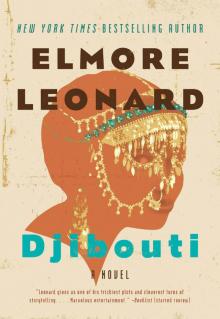 Djibouti
Djibouti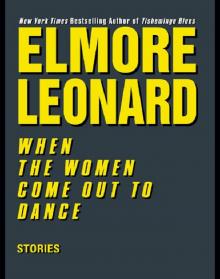 When the Women Come Out to Dance: Stories
When the Women Come Out to Dance: Stories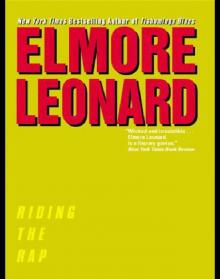 Riding the Rap
Riding the Rap Moment of Vengeance and Other Stories
Moment of Vengeance and Other Stories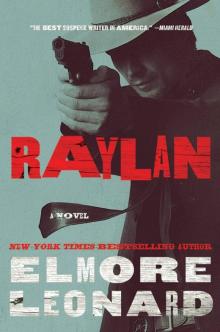 Raylan
Raylan Touch
Touch Mr Majestyk
Mr Majestyk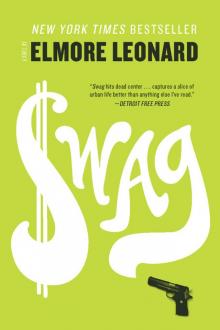 Swag
Swag Road Dogs
Road Dogs La Brava
La Brava The Hot Kid
The Hot Kid Valdez Is Coming: A Novel
Valdez Is Coming: A Novel Be Cool
Be Cool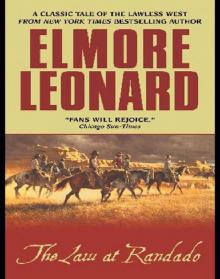 The Law at Randado
The Law at Randado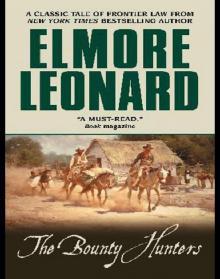 The Bounty Hunters
The Bounty Hunters When the Women Come Out to Dance
When the Women Come Out to Dance 310 to Yuma and Other Stories (1953)
310 to Yuma and Other Stories (1953)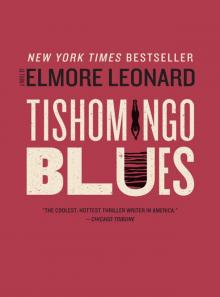 Tishomingo Blues
Tishomingo Blues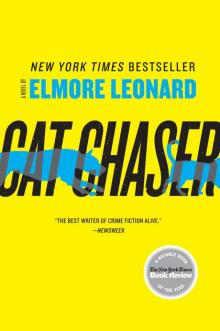 Cat Chaser
Cat Chaser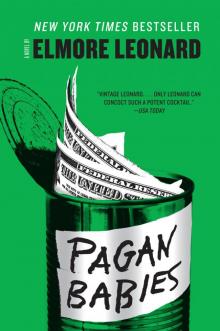 Pagan Babies
Pagan Babies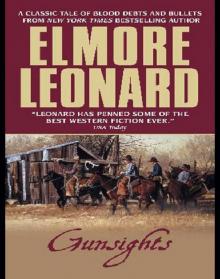 Elmore Leonard's Western Roundup #1
Elmore Leonard's Western Roundup #1 52 Pickup
52 Pickup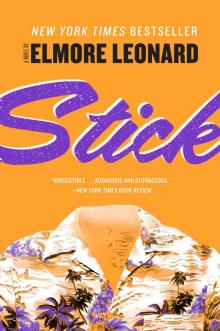 Stick
Stick The Moonshine War
The Moonshine War Valdez Is Coming
Valdez Is Coming City Primeval
City Primeval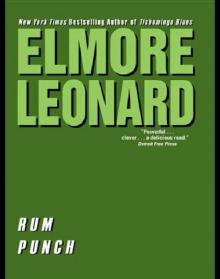 Rum Punch
Rum Punch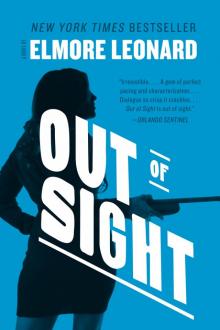 Out of Sight
Out of Sight Naked Came the Manatee (1996)
Naked Came the Manatee (1996)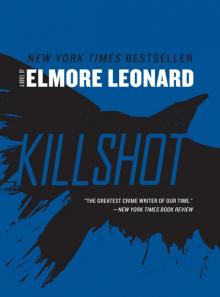 Killshot
Killshot Cuba Libre
Cuba Libre Forty Lashes Less One
Forty Lashes Less One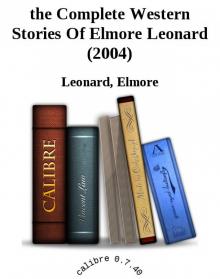 The Complete Western Stories of Elmore Leonard
The Complete Western Stories of Elmore Leonard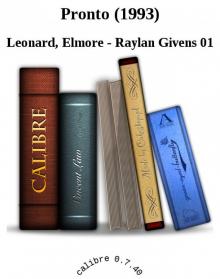 Pronto
Pronto Split Images
Split Images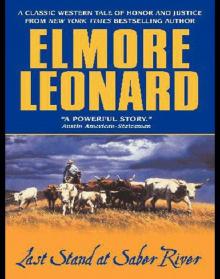 Last Stand at Saber River
Last Stand at Saber River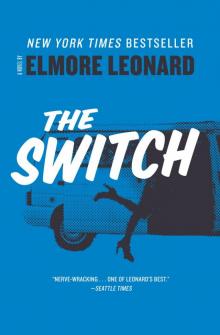 The Switch
The Switch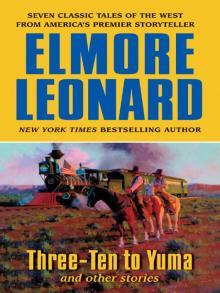 Three-Ten to Yuma and Other Stories
Three-Ten to Yuma and Other Stories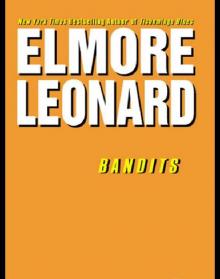 Bandits
Bandits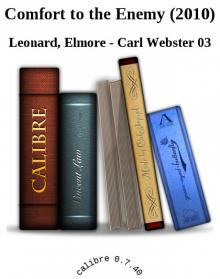 Comfort to the Enemy and Other Carl Webster Stories
Comfort to the Enemy and Other Carl Webster Stories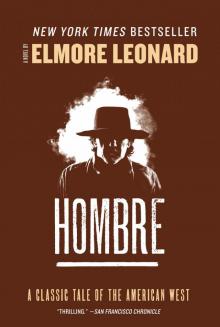 Hombre
Hombre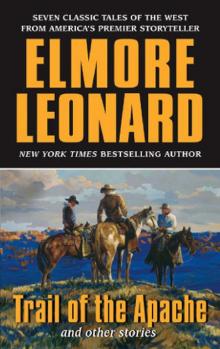 Trail of the Apache and Other Stories
Trail of the Apache and Other Stories LaBrava
LaBrava Gold Coast
Gold Coast Jackie Brown
Jackie Brown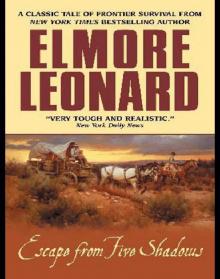 Escape From Five Shadows
Escape From Five Shadows Karen Makes out (1996)
Karen Makes out (1996)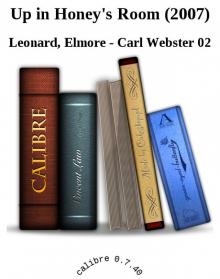 Up in Honey's Room
Up in Honey's Room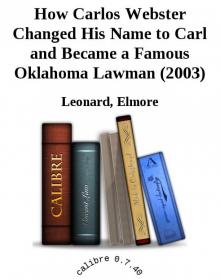 How Carlos Webster Changed His Name to Carl and Became a Famous Oklahoma Lawman (2003)
How Carlos Webster Changed His Name to Carl and Became a Famous Oklahoma Lawman (2003)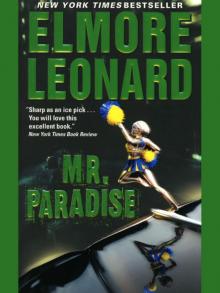 Mr. Paradise
Mr. Paradise The Hunted
The Hunted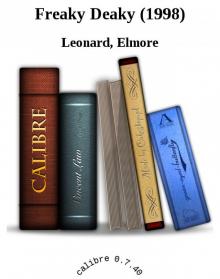 Freaky Deaky
Freaky Deaky Louly and Pretty Boy (Ss)
Louly and Pretty Boy (Ss)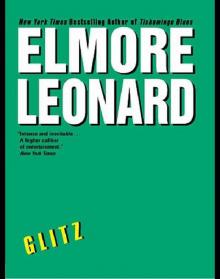 Glitz
Glitz A Coyote's in the House
A Coyote's in the House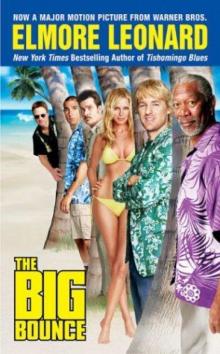 The Big Bounce jr-1
The Big Bounce jr-1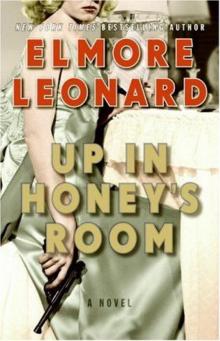 Up in Honey's Room cw-2
Up in Honey's Room cw-2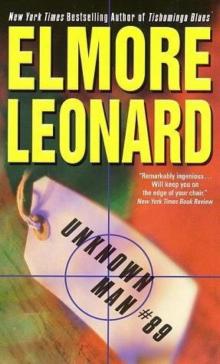 Unknown Man #89 jr-3
Unknown Man #89 jr-3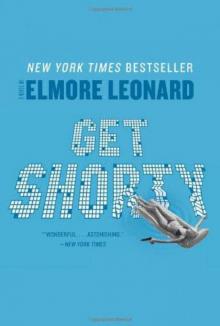 Get Shorty: A Novel cp-1
Get Shorty: A Novel cp-1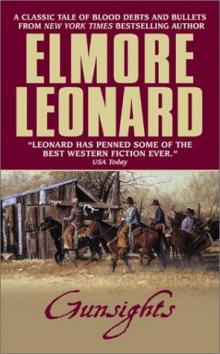 Gunsights
Gunsights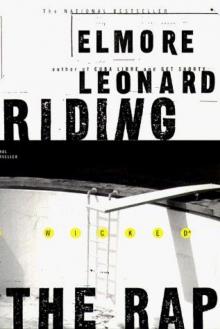 Riding the Rap rg-2
Riding the Rap rg-2